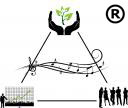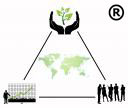ZR = SD sustainable development
Wanda Pazdan
28 Sep 2007
A Google query for a Polish term “zrównoważony rozwój”, or English “sustainable development”, or “ekorozwój”, provides a long list with links to interesting materials related to sustainable development and concerning a wide spectrum of actions – from international ones to those taken in kindergartens.
What is sustainable development? It is a guiding principle for the nations of the world, which in the 21st century, on a massive scale and with tangible results, will become part of political, economic, social actions, as well as those related to environmental protection, at all levels of management, including the level of families and of individual people.
The world history of the idea can be found, for example, at the website of the Ministry of Foreign Affairs.
At international level, the idea was for the first time defined in a concise manner in 1987 in “Our Common Future” report prepared by the World Commission on Environment and Development. According to it,
sustainable development is the “development that meets the needs of the present without compromising the ability of future generations to meet their own needs.”
Is SD another utopian, beautiful idea, or is it something we can, in practical terms, relate to today? Sustainable development is not a dream world or an idea cherished only by a circle of ecophilosophers.
Sustainable development is a result of the system of strategic actions based on principles of sustainable development and action plans agreed upon at international level.
The current Polish “Environmental Law” specifies that sustainable development is a social and economic development in which political, economic and social activities are integrated with maintenance of ecological balance and permanence of basic natural processes so that the possibility to satisfy basic needs of individual communities or citizens of the current and future generations is safeguarded.
Current Constitution of the Republic of Poland treats sustainable development as a constitutional principle, providing each one of us with the right to go along the path of sustainable development in accordance to policies pursued by public authorities (Articles 5 and 74).
The European Sustainable Development Strategy (SDS), also called the Gothenburg Strategy, groups aspects of development into the so called tripple-bottom-line: business, society, environment, and adds the aspect of external policy of establishing international institutions for the purpose of global security.
We no longer deal with only one, strictly related to business, capital – we also have Human Capital, and Natural Capital which serve as a whole.
Each business activity entangles social and environmental aspects.
Each activity of the administration also entangles business, social and environmental aspects.
Each action of a family or each our (as individual human beings) action entangles business, social and environmental aspects…
Each person’s actions may either facilitate or hinder implementation of sustainable development strategy. We have and should have free will. It is all up to us, and our actions should have impact on actions of our children and of all those with whom we associate… If we change consumption patterns, the change of production and service patterns will follow simply as a result of our actions…
Pursuant to the provisions of the amended Gothenburg Strategy (SDS) the member states should have amended and harmonized their strategies with the SDS (approved in 2006). All management levels, including levels of organizational units, should have a harmonized sustainable development strategy. Every two years, the member states are to report the European Council about the state of implementation of the Strategy.
Being provided with information leads to awareness, and awareness leads to responsibility. The growing number of manufacturers and service providers declare adherence to corporate social responsibility in their business activity and publish their strategies of sustainable development on the Internet. We witness the beginning of new era, with a new role of business in society. In 2008, in Davos, Bill Gates was proving that we should go even further than suggested by Muhammad Yunus, the Nobel Peace Prize winner, who in 2006 argued that apart from enterprises oriented for maximum profit (considering capital in its classical meaning), there must be enterprises oriented for maximum social interest (the so called social enterprises). Gates was proving that each enterprise must have a social mission to fulfill, or, in other case, its existence is not justified…
Poland does not have an official document with strategy harmonized with the Gothenburg strategy. At the Ministry of the Environment website I failed to find any information about this strategy or its translation into Polish. I have found some info about the SDS (Polish abbreviation SZR) at the website of the Ministry of Economy, but, again, no text of the strategy was available. My search at the Ministry of Regional Developmentwebsite resulted in finding the National Development Strategy, an implementation of the Lisbon Strategy. Again, no information about Gothenburg Strategy… What is the policy of public authorities? Who coordinates matters pertaining to sustainable development in Poland?
Polish business has a chance to be ahead of the administration in implementation of sustainable development.











